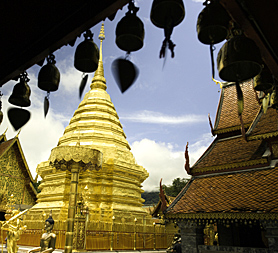Brits among mystery tourist deaths in Thailand
An elderly British couple are among eight tourists to have died from a mystery illness while staying in Chiang Mai, a northern province of Thailand.
All eight stayed locally and all shared the same symptoms of a condition called Myocarditis – inflammation of the heart.
Four of the tourists stayed in the same hotel, the Downtown Inn, including a retired couple from Yorkshire, George and Eileen Everitt, a 48-year-old Thai tour guide and a 23-year-old student from New Zealand.
The latter, New Zealander Sarah Carter, had been staying at the Downtown Inn in February with two friends, Amanda Eliason and Emma Langlands.
The three star hotel, which has free wireless internet and a swimming pool, advertises its basic twin rooms as having air-conditioning, television and a mini-bar, with prices from £19 a night,
On their first night, the girls ate at an indoor food court at the Night Bazaar; Ms Eliason ate a chicken pita kebab, while Ms Langlands and Ms Carter both ate the same red pork curry.
By the following night, the trio had all been admitted to hospital with suspected food poisoning having spent the night at the Downtown Inn.

Ms Eliason and Ms Langlands recovered but Ms Carter died the next morning after suffering heart and kidney failure.
Authorities in Thailand have been accused of covering up the details surrounding the deaths. However, they have ruled out the involvement of drugs or crime in the deaths, and insist they are now awaiting further test results from the rooms.
Chiang Mai’s governor Panadda Disakul has called on the help of the World Health Organisation and said he is currently awaiting lab results from overseas.
Although the bedrooms have been checked for dangerous levels of insecticides, Dr Surasing Visaruthrat of the Chiang Mai public health authority thinks the hotel may have used an unfamiliar chemical.
Dr Visaruthrat told Channel 4 News: “We’ve looked at rodent poison. Insecticides or organo-phosphates maybe. It is difficult because we tested everything.”
“Regarding chemicals, several deaths have occurred abruptly, so we have to find out which kind of chemical substance might have caused the deaths,” said Surasing Wissarusrat, a senior doctor at Chiang Mai’s Public Health Office.
Mr Disakul told Channel 4 News: “We would love to prove to the world that Thailand has nothing to hide. Nothing to cover-up, nothing.”
He said that representatives from the consulates have told him the Thais have reported much progress and showed determination in finding truth. “We are sincere and honest with the investigations,” he said.
Chiang Mai is Thailand’s second largest city around 400 miles north of Bangkok. It is described by the Lonely Planet travel guide as the “keystone of any journey to Thailand”, a modern, cutting-edge Thai city, surrounded by a mass of hills dotted with some 300 ancient temples.
New Zealand investigation
Initially, local police blamed the string of deaths on food poisoning – caused by eating food bought in the local bazaar – while the governor of Chiang Mai claimed it was simply bad luck.
Yet Ms Carter’s father Richard has angrily rejected such suggestions and set up a website dedicated to the tragedy, ThailandTravelTragedies.com.
Meanwhile, undercover reporters for New Zealand’s 3 News booked rooms at the Downtown Inn, posing as tourists. When 3 News arrived, they claimed they found Thai authorities “pulling apart” the room that Ms Carter had stayed in, ahead of a visit from the health authorities.
3 News has cited chlorpyrifos, a potentially fatal toxin used to kill bedbugs, as a possible cause of the fatalities. Yet Thai media has reported the hotel owner insists he stopped using the chemical some time ago.
-
Latest news
-
As India goes to the polls in the world’s largest election – what do British-Indians think?6m

-
Tees Valley: Meet the candidates in one of the biggest contests coming up in May’s local elections4m

-
Keir Starmer says public sector reform will be a struggle7m

-
Nicola Sturgeon’s husband Peter Murrell charged with embezzlement of funds from SNP1m

-
Ukraine might finally get $60billion in American weapons and assistance to defend against Russia3m

-




